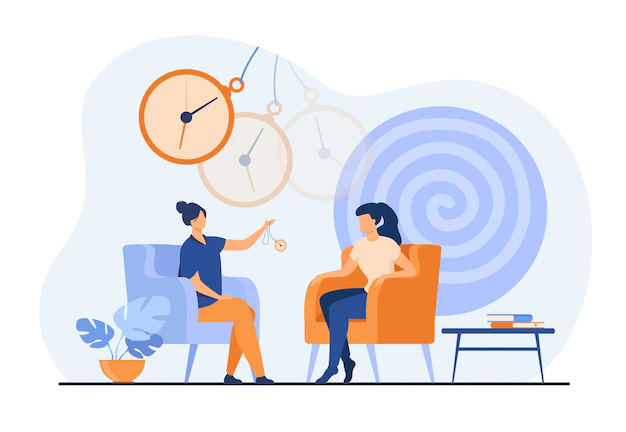Hypnosis is a meditative state of mind in which people have more focus, excitability, and attentiveness. Although hypnosis is commonly defined as a sleep-like condition, it is actually best defined as an intensely focused, highly suggestible, and realistic fantasy state. Although hypnotized individuals may appear drowsy and disoriented, they are quite alert and aware.
Hypnosis is a very genuine procedure that may be employed as a therapeutic agent, despite the fact that there are numerous misconceptions about it. It has been demonstrated that hypnosis offers amazing healing advantages, particularly in the treatment of distress. According to some research, even the symptoms of dementia may be lessened by hypnosis.

Hypnosis Subtypes
The process of inducing hypnosis can be done in a number of different ways:
- Guided hypnosis: This type of hypnosis uses aids like audio and prerecorded directions to put the subject into a trance. This type of hypnosis is frequently used by websites and mobile applications.
- Hypnotherapy: Hypnotherapy is the use of hypnosis in treatment and is carried out by qualified medical professionals and psychiatrists to treat problems such as stress, anxiety, and eating issues.
- Self-hypnosis: Self-hypnosis is the result of an individual inducing a hypnotic state for themselves. It is frequently used as a self-help strategy to manage distress or manage discomfort.
Applications Of Hypnotherapy
Why would someone choose to attempt hypnosis? Some individuals turn to hypnosis to help them cope with severe pain or to lessen the distress and anxiety brought on by surgical treatments like operations or delivery.
Several of the uses for hypnosis that have been shown via study include the following:
- Reducing nausea and vomiting in chemotherapy-undergoing cancer patients
- Eradication or decrease of skin disorders like psoriasis and warts
- Treatment of some ADHD symptoms
- The reduction of irritable bowel syndrome symptoms (IBS)
- Pain treatment during dental treatments
- Therapy for diseases like rheumatoid arthritis that cause persistent discomfort
- Management and relief of labor pain
- Reducing the signs of dementia
The effect of hypnosis
What results does hypnosis produce? Hypnosis experiences might differ greatly among individuals.
During the hypnotic state, some hypnotized people claim to feel detached or extremely relaxed, while others even claim that their activities seem to happen without their conscious will. Others who are hypnotized could still be completely awake and capable of having discussions.
Researcher Ernest Hilgard’s experiments showed how hypnosis may be used to drastically change views. After telling a hypnotized person not to experience pain in their arm, the patient’s arm was submerged in freezing water. Non-hypnotized people had to take their arms out of the water after a few seconds because of the agony, whereas hypnotized people were able to keep their arms in the water for much longer.
Research Findings
While many individuals assume they can’t be hypnotized, studies have found that a good number of individuals are more hypnotizable than they believe. Research indicates:
- About 10% to 15% of people respond well to hypnosis.
- Only 10% of individuals are thought to be difficult or impossible to hypnotize.
- Individuals who are susceptible to fantasy absorption are far more receptive to hypnosis.
- Youngsters have a higher hypnotic threshold.
It is crucial to find a professional with training and expertise in using hypnosis as a therapeutic technique if you are interested in attempting hypnotherapy.
Even though there are several locations where hypnosis education and training are available, it could be beneficial to find a mental health specialist who has earned certification from the American Society of Clinical Hypnosis.
Possible Issues
Hypnosis-related misconceptions are rather prevalent.
- People often recall everything that happened while they were under hypnosis, however, amnesia may happen in very uncommon circumstances. On the other hand, hypnosis can significantly impact memory. An individual may forget specific events that happened before or during hypnosis as a result of posthypnotic amnesia. This impact, though, is often brief and transient.
- Although hypnosis may be used to improve memory, the benefits have been vastly overstated in popular culture. According to research, hypnosis actually has the opposite effect, making memories false or distorted rather than significantly improving memory recall or accuracy.
- Contrary to rumors that suggest that some people have been hypnotized against their will, hypnosis does need the patient’s active permission. The degree to which a person is hypnotizable and suggestible when hypnotized varies among individuals.
- While it is normal for people to feel as though they are acting against their will while hypnotized, a hypnotherapist cannot force you to do anything you don’t want to.
- Hypnosis can be used to enhance efficiency, but it cannot make a person physically stronger or more athletic than they already are.
Hypnosis History
Thousands of years ago, people used trance states that were similar to hypnosis. Nevertheless, it wasn’t until the work of a doctor called Franz Mesmer that hypnosis started to gain popularity.
In the late 1800s, Jean-Martin Charcot employed hypnosis to treat women suffering from hysteria. A variety of ideas have been advanced more recently to clarify the precise mechanics of hypnosis.
Hilgard asserts that hypnotized individuals have dual consciousness or two separate channels of mental activity. A detached stream of consciousness takes input independent of the hypnotized person’s conscious awareness, while one stream of awareness responds to the hypnotist’s recommendations.
